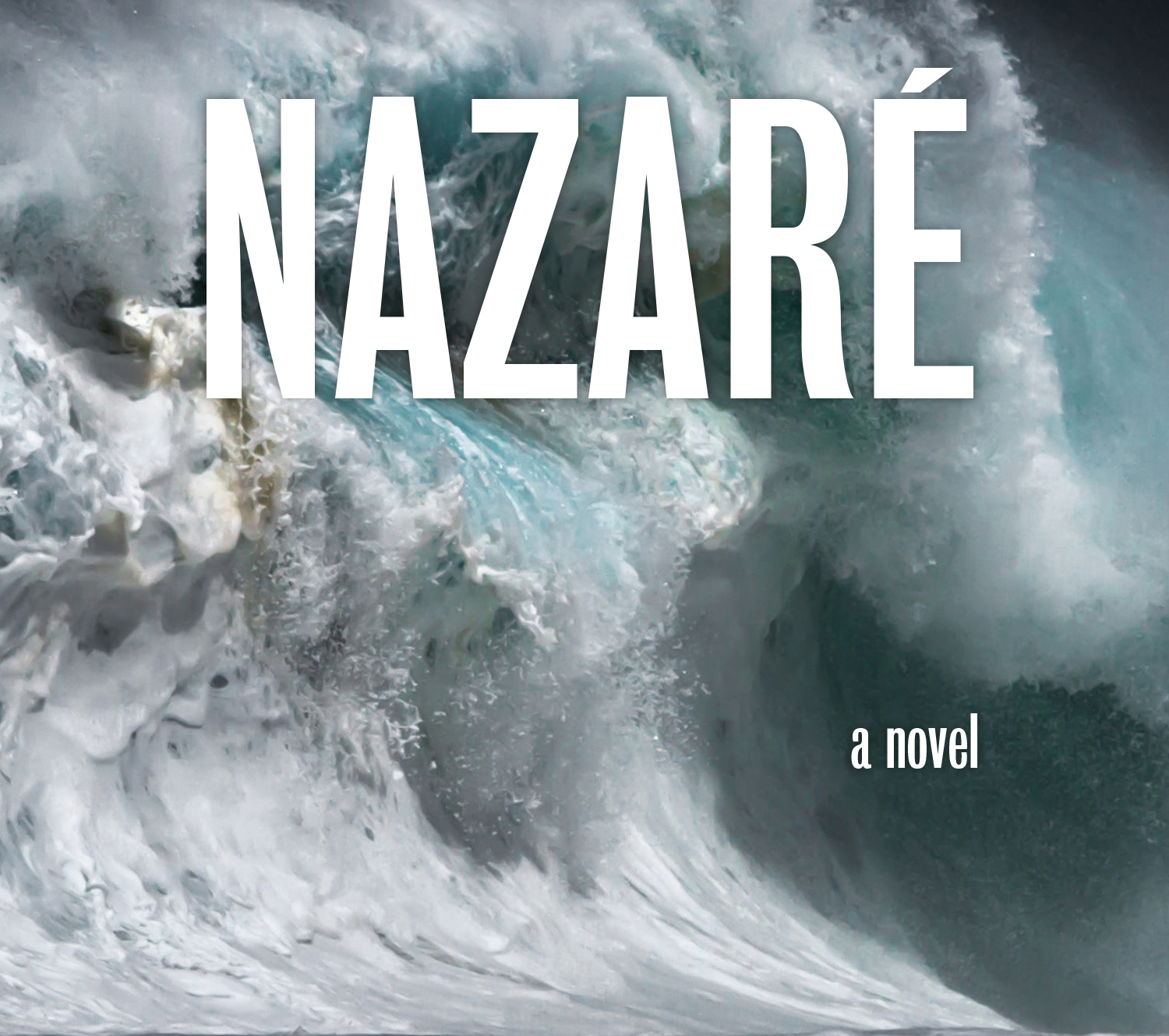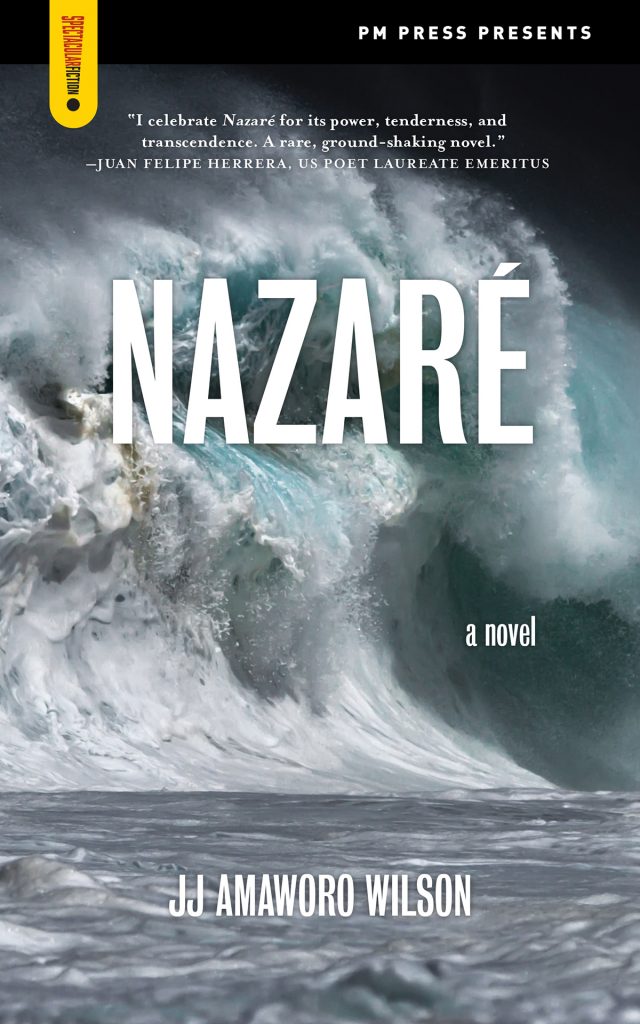By Fabio Fernandes
Ancillary Review of Books
First, let me explain one thing to you, reader: this is a review written by a person born and raised in a Third World country. As a Brazilian citizen, whose first language is Portuguese (our only official language, even if Spanish is spoken at our borders with Uruguay and Bolivia), and who learned English at an early age (because in Brazil when I was growing up, if you wanted to get a good job, you learned English), I find myself in the somewhat easy position of someone who can bridge the gap between languages, both as a translator and a writer.
I’m used to the particular inflections of our tongue, especially the accents. Many languages use diacritical marks. In the Western world, Latin languages use it a lot. In non-Latin alphabets, such as Arabic, Greek and Hebrew, they are also common. But few use it so profligately as Portuguese. What called my attention to this book was the diacritic mark in the title. Nazaré is a Portuguese name, the literal translation of Nazareth. It can be used as the name of a place but most commonly as a woman’s name.
I first read about Nazaré right here on ARB, when I read a call for reviewers that included a small synopsis full of other names and words with accents. And I knew I had to read this book.
The story takes place in the coastal city of Balaal. Balaal is a city that time forgot. A sea town, a city shaped and battered by water, inhabited by superstitious people, who worship many things, from old spirits and seahorses to bits of tree bark and stones. The narrative starts with a whale on the beach. Everyone who lives nearby gathers there to try to push the whale back to the sea, but to no avail. After a while, they give up and go – except for Kin das Ondas, or Kin of the Waves. Kin is an orphan, a street urchin who makes a living helping with odd jobs and lived an average life until the whale incident. Kin is the only one who sees the whale get carried back out to sea, but more importantly: Kin is the one who summons Nazaré.
Nazaré is not the name of a woman or a saint here. Rather, it’s the name of a wave: but not just any wave. It is the wave, a primordial wave, a living one. It is Nazaré who surges and carries the whale away.
They called it Nazaré. You heard it before you saw it. It broke the laws of nature. A wave was supposed to make a wide perfect curl like butter from a knife and then collapse on itself and dissipate onto the shore, disappear like a memory. Nazaré rose tight, like a great rearing horse, higher and higher, overwhelming the other elements.
Nazaré is not the only threat to Balaal, or to Kin. The local ruler, Matanza, and his secret police, the Tonto Macoute, start to see Kin as a threat. Not only does he seem to have the power of summoning Nazaré, and is therefore a witch, but also because there is a prophecy by Fundogu, one of the local shamans: one day, Kin will lead the people in Balaal. In the beginning, Matanza tries to address the threat by means of a more or less legal approach, putting Kin in a strange trial in which the court is ruled by a centenary turtle and an equally old man. With the help of the local fisherman and Jesa, a widow who more or less adopts him, Kin manages to escape, and runs away.
Then Kin is left in peace for three years, during which he lives with Jesa—but the Tonto Macoute send for him again, and this time there will be no trial. Led by the Butcher (their main man) and the Anteater (a woman who can sniff her prey from far away), the Macoute search for him. But Kin will be adopted again, this time by the Professor, leader of a revolutionary community in the hills. The Professor will educate him in the history of Balaal and politics, so he can properly fulfill his role. They will form, with Jesa and a nun called Iquique, a ragtag band of revolutionaries who – with a little help from birds and other beings with whom Kin can communicate – have a final showdown with Matanza and the Macoute to determine the fate of Balaal.
Although Wilson does not describe Balaal to us extensively, he makes the reader see a living entity, “sung into existence by the holy wanderers who were the namers of the universe.” He describes the waterfront and the beaches, the dispossessed and the wretched of the land. There are no kings and queens in Balaal. There is the power of the Tonto Macoute. There is the violence of the machete. Something that I and other Third World dwellers, in our own reality, know all too well.
Here, everything is lacking. People make do with almost nothing, but that is okay, because they survive, they live, and they talk of beauty. This beauty carries over to Wilson’s poetic, almost incantatory use of words. This story is also full of witches, shamans, soothsayers – some of them don’t see themselves as such, some do – whose prophecies always come true. Kin might not have a power of his own, but Nazaré likes him. Nazaré itself requires a kind of translation. This living wave may be the manifestation of the water orisha Yemanja, from the Yoruba religion. In the Brazilian syncretic tradition, Yemanja is associated with the Virgin Mary, that is, Mary of Nazareth, therefore Nazaré. The wave translates between the cultures that have blended to form Brazilian tradition, and it comes to translate, or reinterpret, Kin’s role in Balaal.
English language publications often assume literature set in South America is magical realist, and compare contemporary authors to a small set of South American writers that English-language readers are assumed to be familiar with: Gabriel García Márquez, Jorge Luis Borges, etc. One of the blurbs compares Wilson to Jorge Amado. Maybe this is because of the beach and the sea, two major themes in the first phase of the Brazilian author’s oeuvre? JJ Amaworo Wilson is a German-born Anglo-American-Nigerian novelist and non-fiction writer. He grew up in the UK and has lived in eleven countries. Is Brazil part of that list? At some points along the novel I felt sure it is, because the description of the sea town reminded me somewhat of small fishing towns along the Brazilian coast.
But Wilson is his own man, and he doesn’t do magic realism (nor did Amado, by the way). Even if there are hints of García Márquez in some absurd scenes, such as the apparition of the camel who enters the makeshift courthouse in the middle of Jesa’s trial, what Wilson effectively does is not exactly magic realism: it might qualify as a kind of soft surrealism, though, especially if the reader is not familiar with such surroundings. Nazaré is a very good rendition of a Third World narrative, something which invariably reads as weird for any non-native, but which should be read whether you have a translator nearby or not.
Fabio Fernandes (he, him, his) is an Associate Professor at Pontifícia Universidade de São Paulo. He is the two-time recipient of the Argos Award for Best Fiction and has published several books, including the novels Os Dias da Peste and Back in the USSR, the collections L’Imitatore and Love. An Archaeology, and has published short stories for venues around the world. Also a translator, he is responsible for the translation to Brazilian Portuguese of several SF novels, including Neuromancer, Snow Crash, and A Clockwork Orange.








